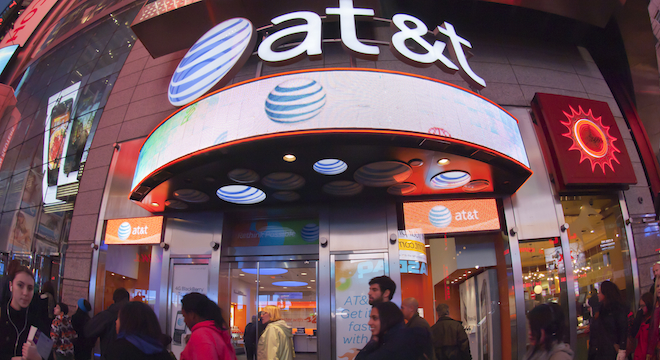AT&T and T-Mobile won’t be merging to form the nation’s wireless company anytime soon. Actually, now the two companies won’t even be going to court to defend their proposed merger from the government’s antitrust allegations anytime soon, either.
That’s because the federal judge presiding over the case, Justice Ellen Segal Huvelle of the U.S. District of Columbia, on Monday granted the unusually-unified requests of all three parties involved in the antitrust case — defendants AT&T and T-Mobile and plaintiff the Justice Department — to indefinitely postpone the trial, which had originally been set to begin February 13, 2012.
The Justice Department was the first party of the three involved that sought to delay the trial, filing a request with Justice Huvelle on Friday for a stay, or, in the event that couldn’t be granted, a motion to withdraw its case against the proposed $39 billion merger, the Wall Street Journal reported.
AT&T, which had initially objected to any delay in the trial, on Monday made an about face, joining with the Justice Department in asking the trial to be indefinitely postponed.
As AT&T wrote on its Public Policy blog: “AT&T and Deutsche Telekom advised Judge Huvelle this morning that they wish to stay any further Court proceedings until January 18, 2012, to allow the two companies time to evaluate all options.”
Judge Huevelle gave AT&T what it wanted, a status conference on January 18, 2012, which will decide whether the trial will proceed at all, and if so, in what fashion — or be scrapped entirely, should AT&T decide the merger isn’t worth all the trouble anymore.
The reason the DOJ gave in wanting to delay its own lawsuit against AT&T, originally filed in September, was that a trial isn’t necessary anymore, at least not yet, given that AT&T on November 25 had moved to withdraw the merger from review by the Federal Communications Commission.
FCC approval was needed for the merger to succeed in the first place because only the FCC can greenlight AT&T’s acquisition of T-Mobile’s wireless spectrum licenses (the licenses to use specific radio spectrum frequencies in the U.S.). AT&T could still re-jigger the merger and come back to the FCC with a new plan, but that will likely take some time and frankly, some creativity, given how opposed regulators have been to the merger thus far.
And to think, AT&T was so convinced that that its original deal would be rubber-stamped by the FCC that AT&T CEO Randall Stephenson reportedly bragged to New York Times Dealbook reporter Andrew Ross Sorkin: “When you get to the facts, this is a deal that gets approved” — despite the criticism of numerous consumer and industry groups, not to mention some lawmakers.
But on November 22, news broke that the FCC was moving toward holding its own hearings on the merger, a really bad sign for AT&T, which had hoped to speed the transaction through the 180-day review process.
Not only that, the FCC later twisted the knife into AT&T on November 29 by approving AT&T’s request to withdraw, but also releasing a lengthy, scathing report on the merger, concluding that AT&T and T-Mobile “failed to meet their burden of demonstrating that the competitive harms that would result from the proposed transaction are outweighed by the proposed benefits.”
In light of that report, which AT&T repeatedly criticized as unfair, AT&T has since retreated into a corner and is licking its wounds, reportedly considering any option — including a much weaker joint venture — that would allow it to combine with T-Mobile and avoid paying T-Mobile’s German parent company, Deutsche Telekom, a $4 billion fee to breakup the merger.
Another reported plan would have AT&T agreeing to sell up to 40 percent of the T-Mobile assets it would acquire in the merger to another, smaller wireless company, possibly Leap Wireless or Metro PCS.
Whatever AT&T decides to do, it needs to move fast: DISH Network, the nation’s second-largest satellite TV company, is now also seeking to buy T-Mobile and use its spectrum to “create a national wireless network, video, voice and data,” according to DISH CEO Joseph Clayton in an interview with Bloomberg published Monday.
The FCC on Monday gave AT&T a break on another proposed transaction: Its acquisition of telecom company Qualcomm’s spectrum. The FCC restarted the 180-day “shot clock” it has for reviewing that transaction, separating it from the proposed T-Mobile deal (the two separate transactions had previously been combined for purposes of FCC review, which could’ve killed two of AT&T’s birds with one FCC stone, but more).
AT&T declined to comment for this report. TPM has reached out to the Department of Justice and the FCC for more information on their next moves and will update when we receive a response.









